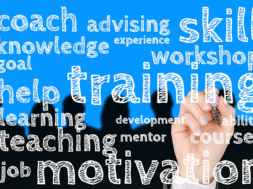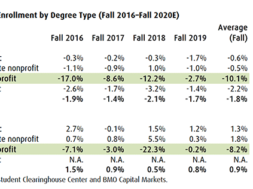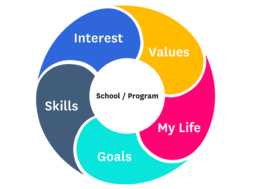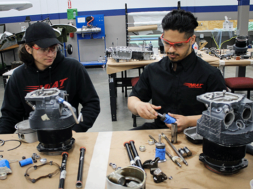
Turning Strangers into Students® (and Advocates) – A Study on Inbound Marketing and Recruitment in Higher Education (Part 2)
By Dr. Jean Norris, Managing Partner, Norton|Norris, Inc. and Linda Ganster, Managing Partner, The Grandview Group
Welcome to Part 2 of our 3-part series “Turning Strangers into Students® – A Study on Inbound Marketing and Recruitment in Higher Education.” In Part 1, we looked at both the challenges and opportunities that face the career school sector with a focus on those working in admissions. And the hits keep coming – with lawsuits, fines and more school closures. In the past two months alone we have seen EDMC settle a lawsuit for $95.5 million and offer $102.8 million in loan forgiveness; Westwood College cease enrollment; and the owner of FastTrain College was found guilty on charges of theft and conspiracy. Each of these headlines was due, in part, to issues occurring in the recruitment of students.
The urgency to move forward has never been stronger. Outdated business models and recruitment practices coupled with resistance to change are holding the career college sector back.
As we studied how other industries have confronted marketing and sales challenges head on, we discovered several opportunities that can be applied to the higher education sector.
The 3-part strategy we proposed includes a new student engagement model; puts forth the value of automation in admissions; and advocates for enhanced professional development for admissions representatives. Finally, we developed several hypotheses derived from this proposed strategy and outlined a research plan and timeline.
In this second part of our series, we’ll share what we have learned to date (including some surprises) and new areas of investigation that will define the next phase of our study. We’ll also present an outline of the final research stage and will reveal the cumulative results in an upcoming issue of Career Education Review (CER).
The Strangers to Students Model®
This model is adapted from a proven inbound marketing strategy and promotes methods to align marketing, recruitment and support efforts with the student journey in an ethical and effective manner (Image 1).
Image 1: The Strangers to Students® Model
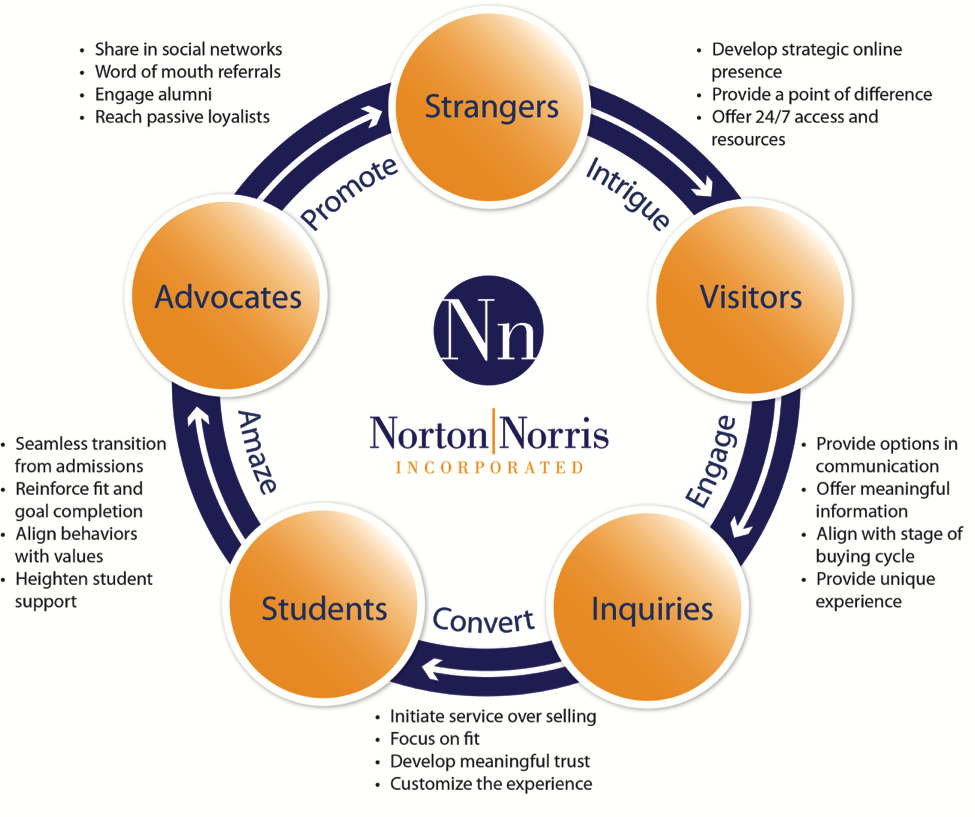
The journey begins when a prospective student realizes your school exists (Intrigue), and this is where content is king. Providing resources in multiple formats to help them solve problems that are important to them is key (versus pushing your solution). The content also needs to be dynamic enough that it Engages the prospect to respond to something (i.e., watch a video, download a paper, take a proven/valid assessment, request a meeting, etc.). It is also crucial that the content be meaningful and compliant rather than simply some sales gimmick. Although the consumer may fall for a shiny promotion in the short run, the odds are that they will catch on later and that can end the student journey on a sour note (and perhaps show up as a black mark in social media). As a reminder, if your content is outsourced, your school is still accountable for those acting as an extension of your admissions office.* Schools must avoid any further bad press since every negative headline impacts the sector as a whole.
Nurturing the prospective student through their journey comes down to providing the right content in multiple formats at the right time. And since the prospects determine what “right time” means, make sure to have a variety of methods for them to connect with your school 24/7. Not only does this methodology provide you with a way to track prospects through the student journey, it also creates more educated and inspired inquiries who are ready to take the next step (Convert).1
Research also shows that combining traditional media with inbound marketing provides the best results. After all, Strangers need to know you even exist so they can visit.
Research plan
In deploying a beta version of My Guidance Coach® (MGC) as a means of exploring the three-part strategy outlined (new engagement model / automation / enhanced professional development), the team focused on six hypotheses:
- H1: The Strangers to Students Model® is effective in improving student engagement.
- H2: Automation of a prescribed coaching process is desirable for prospective students.
- H3: Automation of a prescribed coaching process is desirable for admission professionals.
- H4: Automation of a prescribed coaching process positively impacts ROI.
- H5: Automation can improve accuracy of information provided to prospective students.
- H6: Admission professionals desire enhanced training and development opportunities.
To test these hypotheses, data was collected (and continues to be collected) using multiple methodologies across the 22 campuses involved in the beta test. This includes:
- A pre-beta survey of admission representatives about their roles, the students they deal with, and how their environment is changing.
- Extensive data mined directly from the MGC application.
- In-depth interviews delving into the experiences and opinions of the point person at each of the schools involved in the beta.
- A post-beta survey administered at the end of the year to revisit the admission representatives’ experiences after they have had an opportunity to fully engage in My Guidance Coach®.
During the beta period, the schools involved were asked to deploy MGC using three tactics.
- Tactic 1: Email blasts. As an introduction to the product, schools were encouraged to send a link to MGC to older inquiries that had been worked in the past.
- Tactic 2: Banner/tile placement. Each school was provided with a choice of banners/tiles to place on its website to link prospective students to MGC.
- Tactic 3: MGC-assisted interviews. Schools were trained to use MGC to support live interviews with prospective students, both in person and by phone.
In addition to these tactics, schools were encouraged to use MGC in other ways that fit their individual business strategies. In response, some schools placed MGC in their social media; included it in auto-responders; used it as a follow to new inquiries; and one school even used it in high schools.
As a separate phase of research, the team shared MGC with current college students and solicited their feedback on the experience.
Findings
At this time, schools are at different stages of implementation. Consequently, the most informative results have come from the schools that have been able to most fully execute all of the MGC tactics to date. We will give special attention to the experiences of those schools, as we examine data relating to each of the hypotheses.
H1: The Strangers to Students Model® is effective in improving student engagement.
Making the choice to click on the link to begin the MGC coaching process indicates a higher level of engagement than passively completing a form with general information. Early indicators show that MGC does not take away from other lead generation efforts and in fact, has increased leads/inquiries at some campuses (although MGC not necessarily intended as a lead/inquiry generation source).
In addition, one school group shows a 7 percent increase in contact rate (voice-to-voice contact) for those prospective students in MGC versus other lead sources.
H2: Automation of a prescribed coaching process is desirable for prospective students.
Once in the software, 8 percent of students raised their hands indicating they desired to connect with an admissions representative. 71 percent of those students went on to complete an action plan indicating they want to schedule an appointment or find out how to apply to the school.
61 percent of students entering MGC have remained active in the “My Info” stage (Image 2). This could be indicative of a reluctance to move forward or an indicator of a slower buying cycle. More than 90 percent of those did not select a start date either.
13 percent of prospects in the system completed the entire admissions coaching session and developed a plan of action entirely on their own.
77 percent of prospects that completed the coaching session and plan on their own indicated they believed the school/college was the right fit for them. The remaining 23 percent indicated they were unsure if the school/college was the right fit. None of the prospective students indicated the school/college was the wrong fit for them.
In interviews with students, many found MGC to be engaging and appealing. Select quotes included2:
- “The introduction is to-the-point. Unlike many ‘free’ websites, I do not feel like I am getting tricked into something.”
- “I like the one-stop shop. Having all of the resources in one place saves a lot of time.”
- “There is a lot of material here that I would have to search for otherwise.”
- “I like that it is free!”
- “It takes something that can be complex and scary and makes it clear and step-by-step.”
- “I am considering my options as I plan to transfer, and this looks like it is a great tool.”
- “I like that it is available on my schedule.”
- “The Raise Your Hand feature is cool. I like that I can get help how and when I want it.”
- “I was interested in an online school but after I asked one question, they began to harass me by phone every week.”
- “This would be a great tool even once you were enrolled to keep track of things like scholarships and bus schedules.”
Image 2: Student Population by Stage
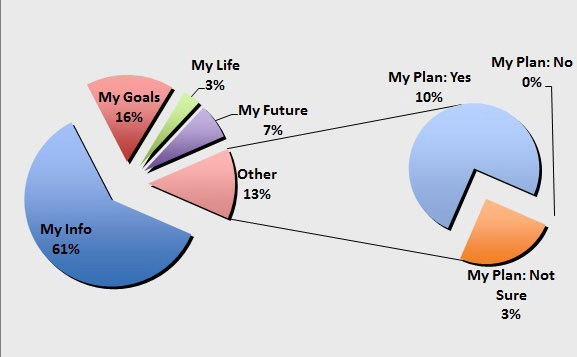
H3: Automation of a prescribed coaching process is desirable for admission professionals.
Admissions representatives who have engaged prospective students in MGC are reporting they are happy with the quality of the information gleaned from prospective students and the ability to export the data into their existing contact management system.
In comparison to calling inquiries multiple times with basic lead information, administrators expressed that they see value in understanding much more about a student’s needs and concerns in advance of contacting them.
Admissions representatives are not alone in experiencing the frustration of making outbound calls to little effect. According to Hubspot’s State of Inbound Marketing 2015,
this issue is compounded by the fact that salespeople lack vital information before they reach out to leads.” Because MGC provides an abundance of insight into the prospective student’s life, many see the immediate ROI of adding MGC as an alternate contact method with the goal of engaging the prospect. In addition, the data provided to the admissions professional is highly informative and comparable to a well-executed admissions interview/coaching process. 3
Another benefit to admission administrators is the use of aggregated MGC data in planning and allocating resources (Image 3). For example, one campus discovered that 8 percent of students indicated a transportation problem and could identify their locations, allowing them to customize a response to address the issue
Image 3: Student Challenges
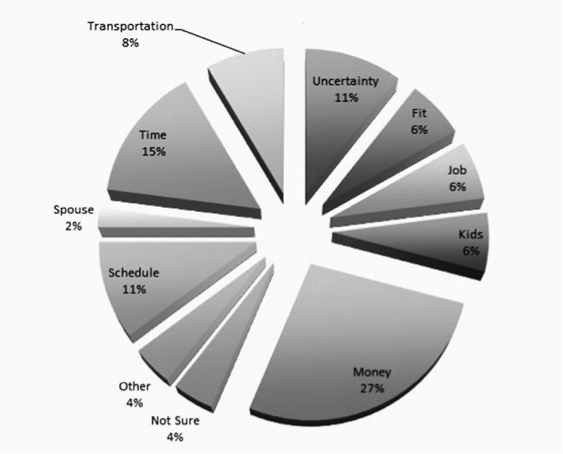
Interestingly, there has been pushback that we can only define as resistance to change. Some participants have expressed concern over how their performance will be evaluated; how new ways of doing business “mess up” their current ways of measuring things; and the fear that their job will be replaced with software. Although the automation of the admissions interview may make some nervous about their job, research shows that the role of sales is still important, but changing. According to a survey of nearly 4,000 marketing and sales professionals, when it comes to sales efficiency and productivity, “No matter how you slice it, it’s preferable to conduct business virtually.”3
H4: Automation of a prescribed coaching process positively impacts ROI.
Early evidence indicates that MGC has not cannibalized inquiries coming from traditional sources and has resulted in a 10 percent increase of inquiries for one beta school group. In addition, another school group shows a 7 percent increase in contact rate (voice-to-voice contact) for those prospective students in MGC versus other lead sources.
H5: Automation can improve accuracy of information provided to prospective students.
In interviews, admissions administrators embraced MGC as a risk management resource. By ensuring that every prospective student has access to the same information and by making the admissions process transparent, administrators are assured that their people and processes are performing to a compliant, consistent, defensible standard.
H6: Admission professionals desire enhanced training and development opportunities.
Most of the administrators interviewed were very satisfied with the professional development programs available to their representatives, but none indicated that they are offering a structured curriculum, CEUs, membership in any professional associations, or credentials with currency beyond their own institution.
Conversely, in discussions with management, some were concerned that their admission representatives did not have the cognitive ability to work with students if it required making judgment calls or if they were not scripted.
A recent survey3 indicates “growth opportunities” as the number one most important factor for those working in the sales profession (Compensation, work-life balance and company culture were much farther down the list). This is significant for those hiring and developing their admission teams. Creating new growth opportunities for admission representatives to retain top performers is essential.
Some further ideas offered for the professional development of a team include:
- Create opportunities for them to mentor other professionals in the field.
- Provide educational and/or training opportunities.
- Give them additional responsibility.
- Allow them to cross-train in a different department.
Lessons learned
Certainly any product or concept worth it’s salt should be tested extensively before fully endorsing. Our goal is to push the envelope further and deliver proof of concept out here in the public eye for all to see because this study is about something so much bigger.
If this sector is to survive (and thrive once again); we need new ways of thinking; updated business models to work from; and training and development for those on the front lines.
As evidenced by the negative headlines, school closings, fines, and excessive turnover of staff, those working in this sector simply cannot continue with business as usual. It is also time to fully adapt to the reality that student’s buying preferences have changed and, therefore, so must admission practices. These realities push for new models, new ways of reaching students, and new ways of helping those who coach and counsel students to get the skills they need to do their jobs effectively.
So far in this study, the good news is there are a number of wins as well as opportunities to serve students and those working in the higher education sector. Even attempting something that ends up not working is still worth the effort if the concept can be eliminated from the consideration set, right? It gets us closer to the truth. Let’s take a look at some of the current lessons learned:
- 24/7 access is key! As one manager told us, the best part of MGC for his reps is walking in on a Monday to admission interviews that were conducted while they were off for the weekend. One senior administrator stated his admission managers don’t like making the team work on Saturdays, and it has shown to have limited ROI anyway. MGC appears to solve this morale/production problem while still serving students.
- Building trust and nurturing relationships is critical. Prospects may be reluctant to provide personal information online or too early in the process because they are wary of being sold to or are concerned about protecting their information. Consequently, it is important to clearly convey the value of what they will receive once they invest their time in the discovery process by providing a more tangible and compelling value proposition.
- ROI measurements must be reexamined for relevancy. The old admissions funnel with a focus on pushing the upcoming start date and immediately converting inquiries to stages that aren’t relevant to consumers (i.e., phone contact, appointment set, appointment show) must be replaced with enrolling the right fit to graduate. The focus on student outcomes demands we take a fresh look at our expectations in this area and realize that ROI isn’t in the conversion of a lead to a start…it’s in the conversion of a qualified inquiry to a successful graduate.
- Tipping the traditional admissions funnel is going to break some eggs. Adapting to any type of change presents challenges, but replacing the traditional sales funnel prompts a major adjustment for the management, the staff, and the systems within a school, as well as for the vendors that serve the school. The current model is so entrenched that measures of success and accountability are built around it.
The first step is to recognize that shoving more and more unqualified leads into the top of the funnel is no longer a compelling strategy; there is work, in some cases daunting work, to be done in order to shift to a new model and its strategies. Secondly, vendors and employees alike who have an investment in the old model are not going to quietly stand aside while change happens. Their resistance can be a result of fear, selfishness or even contentment with the status quo. This can make an already challenging undertaking noisy and chaotic. Change management strategies and dealing with those entrenched in the past, must be implemented to be successful.
Keep in mind that the non-profit world is already moving to new models to engage low-income, first-generation student needs noting that these students can become easily derailed. “Giving information isn’t going to get the job done either,” states Nyhan4. The “nudge concept,” offering hope and positive messaging, is being used with great success to keep prospective students motivated and moving through the student journey.
- There will always be competition for mindshare, no matter how important the priority. During beta testing, schools were delayed by other urgent priorities, such as the rollout of a new CRM, class starts, and opening new campuses. As a result, the schools involved were varied in their abilities to fully engage with My Guidance Coach® during the beta period. Our team assisted more than originally planned with system set up, training, and customized upgrades to the software. There is no reason to believe that this will change as we move forward.
- New methods require updated training for admission representatives. With new ways of doing business comes new training and even new skills to do a job that was once highly scripted. This can be intimidating, but once complete, admission representatives will have a new set of valuable competencies. After all, working from scripts isn’t actually providing the results or protection as once thought, has it?
- Don’t forget the high school counselors. Our continued conversation with school counselors has reinforced their need for assistance in serving students. One of the beta schools reached out to their feeder high schools to assist them by offering MGC. Further input is needed, however MGC may proactively addresses the national shortage of high school counselors mentioned in Part 1 of this study as one of the contributing factors to the challenges facing today’s student.
- Compliance, compliance, compliance. Beta schools identified compliance as a key element of MGC’s appeal. Through the use of MGC, a college can transparently demonstrate that every prospective student had access to the same, complete information and that, once in the system, each one had a consistent experience with a strong emphasis on making well-informed choices. Risk avoidance offers such a compelling reason to implement updated training and/or automation that it could stand-alone as an argument for adoption. One lawsuit (factual or not) can undo decades of success. Why risk it?
To reinforce this point, Bill Ojile, partner at the law firm of Armstrong Teasdale shares his thoughts:
“You have seen a dramatic shift over the last few years on what types of approaches taken and information provided are acceptable in the admissions process. Going forward in admissions, transparency, providing prospective students with the information and tools they need to make informed decisions and being able to back up representatives’ statements and school collateral with school specific data will be key focal points in compliance. Schools who do not embrace the changed realities of AGs, regulators and accrediting bodies’ expectations of the admissions process risk entanglement in investigations and lawsuits that could cost them millions of dollars to defend. There is little you can do about the past, but all schools should be taking immediate steps to reform and enhance their admissions practices for the new realities of today’s market. Tools such as MGC and mystery shopping can provide comfort to school leaders and objective proof to external parties of the school’s consistent, compliant and transparent admissions practices.”5
Next phase
We will close out beta testing this month and analyze all data points. A compelling action item that has emerged already from this study is the need to give a voice to the admissions professional. A committee of experts from career education (for-profit, non-profit and high school counselors) has already been established to move this agenda forward. Research will begin in early 2016 to examine their needs, job performance and career satisfaction and will be revealed this summer at an Admissions Symposium (Please keep an eye out for more information and the survey).
Additional input from high school counselors will also be sought. A focus group is planned for December to discuss their viewpoints on the career education sector, the role they play in promoting career education, and advice they can share on moving the admissions profession forward.
We will also administer the post-beta survey to the admissions representatives at the beta schools. The goal of this survey is to determine how moving to the new model impacted their interactions with prospects and how they allocate their time.
Further data will be mined from the overall beta experience to complete the investigation into the research hypotheses.

DR. JEAN NORRIS , is one of the leading advocates for the Admissions profession. In her 28-year career, she has served in the role of admission counselor, dean of admissions, faculty member, vice president of marketing, vice president of enrollment management, and vice president of organizational development at private colleges and universities across the U.S. Currently, Jean is a managing partner at Norton Norris, Inc., a Chicago-based marketing/consulting/training firm focused exclusively in the higher education sector.
Jean is the visionary behind the patent-pending software, My Guidance Coach® (MGC), which is an extension of the proven EnrollMatch® admissions training program. Thousands of admission professionals have already realized the impact of the EM system and the automation of key components was a natural next step to meet the needs of compliance and today’s student.
Dr. Norris earned a Doctor of Education Degree in Organizational Leadership, a MA in Communication and Training and a BA in Management. Jean is also a Licensed Master Neurolinguistic Programming (NLP™) Practitioner.
Contact Information: Dr. Jean Norris // Managing Partner // Norton|Norris, Inc. // 55 E. Jackson Blvd., Suite 950 Chicago, IL 60604 // 312-262-7400 // Jean@nortonnorris.com

LINDA GANSTER, has three decades of experience in higher education product development with companies like Pearson, McGraw-Hill and Cengage Learning. As Editor in Chief at Cengage, she managed the $200M behavioral, biological and earth sciences editorial group.
Currently, Linda is a Managing Partner at The Grandview Group, an innovative educational technology company with a passion for ideation, validation and execution. GVG’s clients include colleges and schools, publishers, associations, and large and small companies.
Contact Information: Linda Ganster // Managing Partner // The Grandview Group // 2150 Country Club Dr. #12 Mesa, AZ 85210 // 650-208-7045 // lganster@thegrandviewgroup.com
Citations
1. Fienbork, Frank. “How Does Inbound Marketing Work? [Infographic].” How Does Inbound Marketing Work? [Infographic]. EMyth, 27 Sept. 2014. Web. 02 Dec. 2015.
2. Ganster, Linda S. Guided My Guidance Coach Student Walkthroughs. 31 May 2015. Raw data. Tallahassee, FL.
3. State of Inbound 2015. Rep. Hubspot, 13 Oct. 2015. Web. 2 Dec. 2015.
4. Nyhan, S. “Keeping Low-Income Students on Track- Steering Students to Success.” The Journal of College Admission No. 229.Fall (2015): n. pag. Print.
5. Ojile, William M., Jr. “Compliance Issues for Career Colleges.” Telephone interview. 1 Dec. 2015.

